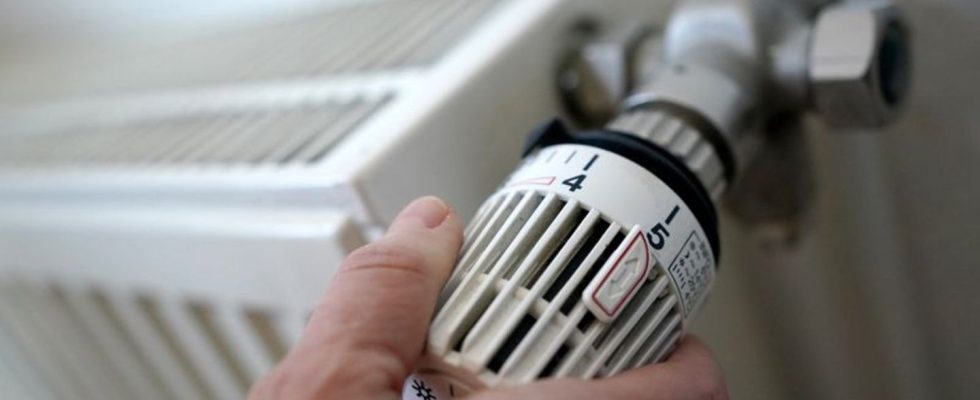federal government
FDP calls for “realistic schedule” for heating law
A woman turns a heating thermostat. photo
© Marcus Brandt/dpa
Much need for discussion, little time: Whether the heating law can really be passed by the Bundestag before the summer break seems to be an open question. A sensitive issue is the cushioning of social hardship.
After the resignation of State Secretary for Energy Patrick Graichen, the traffic light coalition is discussing the timetable for the law to replace oil and gas heating systems. The FDP is sticking to its call for a comprehensive revision of the draft and wants the necessary time for this.
The SPD also thinks changes to the content are appropriate, but wants to bring them into the deliberations on the law in the Bundestag and start next week. The Greens are pushing for the law to be passed by early July – and then come into force in early 2024.
FDP sees a personnel problem
However, the energy policy spokesman for the FDP parliamentary group, Michael Kruse, told the “Rheinische Post”: “In view of the restructuring in the ministry’s top management, Minister Habeck should propose a new, realistic timetable for the heating law and use the time until then to fundamentally review it to revise.”
Economics Minister Robert Habeck (Greens) announced Graichen’s withdrawal on Wednesday after he had not sufficiently separated private and professional life in two understandable cases. It is not yet clear who will succeed Graichen. Kruse emphasized: “The consultations cannot be continued without a contact person in the Ministry of Economic Affairs.”
SPD wants substantive consultations
On the other hand, SPD parliamentary group leader Katja Mast told the editorial network Germany (RND): “We want to start deliberating the heating law in the Bundestag next week. That would be the official starting point for the negotiations in Parliament, and we should do everything we can to conclude by summer to be able to.”
The schedule is tight: the parliamentary summer break begins on July 7th – that’s when the Federal Council meets for the last time. According to the plan, the Bundestag will not meet again until the beginning of September. State elections in Hesse and Bavaria are scheduled for October 8th – a date that political strategists should have firmly in mind.
Details on cushioning social hardship open
According to the draft of the law passed by the Federal Cabinet, from 2024 every newly installed heating system should be operated with 65 percent renewable energy. This should apply to all owners up to 80 years of age. Existing oil and gas heaters can continue to be operated, broken heaters can be repaired. This is how the farewell to climate-damaging gas and oil heating systems is to be heralded. According to the Ministry of Economic Affairs, the switch should be “supported by targeted funding”, which also cushions social hardship.
However, it is still unclear what this could look like in concrete terms. SPD politician Mast told the RND that it was crucial that the funding for the conversion was designed in a socially balanced manner. One must “take even greater account of factors such as income”. In addition to the heat pump, other alternatives to gas and oil heating should also be available for existing buildings. Deadlines and hardship regulations must also be “extended if necessary”.
SPD leader Lars Klingbeil admitted in the “Rheinische Post”: “We didn’t get off to the best possible start with the heating law. It was unfortunate that we first talked about the climate issue and now the social aspect has to be put aside.” For example, there must be social differentiation based on income. The core of the law remains: “From January 1, 2024, every newly installed heating system must be operated with 65 percent renewable energy.”
Greens: Funding of up to 80 percent for small incomes
The chairwoman of the Greens in the Bundestag, Katharina Dröge, told the “Rheinische Post”: “We Greens in the Bundestag propose increasing the subsidy to up to 80 percent of the costs for small incomes.” According to her, medium incomes of up to 60,000 euros a year should also receive higher funding.
“We propose a staggering of the subsidy for everyone above the basic subsidy of 30 percent.” Dröge advised homeowners not to quickly install a new gas heating system. “Anyone who buys a gas heater again now is betting against compliance with the climate targets and is making a bad investment.”
City Day also calls for a revision
According to General Manager Helmut Dedy, the German Association of Cities does not believe in putting the law on the back burner. “If we want to achieve climate neutrality in heat supply by 2045, we need decisions now.” But the law needs to be changed.
“This is possible in the ongoing legislative process,” Dedy told the newspapers of the Funke media group. Some deadlines that are too rigid should be relaxed – for example the obligation to ensure a 65 percent share of renewable energies in the heating network as early as 2035: “That shouldn’t be feasible everywhere.”

